
 printable page
printable page
The Internet, which came to Indonesia during the early phase of the political crisis in the 1990s, has risen both economically and politically to become an alternative medium that has found its way out from under the control of the state1

When Suharto, was forced to step down in May 1998, writers drew a parallel between this event and the Zapatista Net movement in Chiapas2, implying that the political revolution in Indonesia was (Inter)Net-driven 3
1. Hill D. and Sen K. (2000) "The Internet in Indonesia's New Democracy"
2. Basuki T. (1998) "Indonesia: The Web as a Weapon", Development Dialogue 2: The Southeast Asian Media in a Time of Crisis
3. Marcus, D. L. (1999). "Indonesia Revolt Was Net Driven"
While the networking form of social organization such as the warung has existed in other times and spaces, the warnet paradigm has provided the basis for its near-simultaneous expansion throughout the entire social structure. [...] The nodes of cyberspace-warnet and warung-like settings joined to create a powerful network that, in the case of Indonesia at the end of the twentieth century, was more dynamic than the collapsing networks of the state-corporate economy. 1
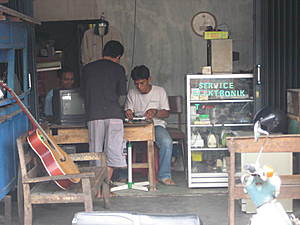
Castells refers to this out come as "the pre-eminence of social morphology over social action" a pre-eminence that is the main characteristic of network society.
1. Merlyna Lim (2003) The Internet, Social Network and Reform in Indonesia
The year 2003 witnesses a significant ICT development in Indonesia especially at policy and regulatory level.
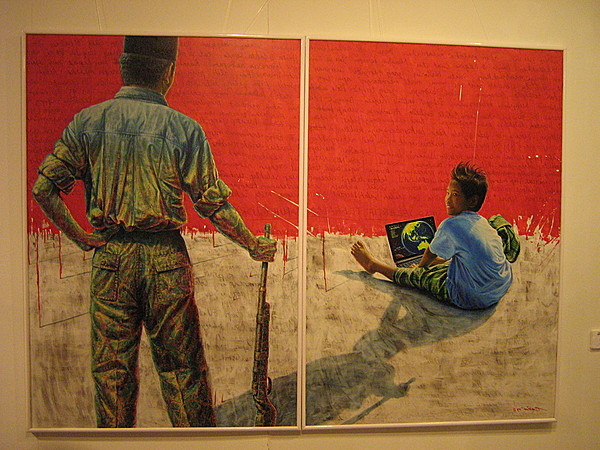
The World Summit on Information Society in December 2003 drives a significant impact tuning the policy and regulatory framework of the country to meet the objectives of WSIS, such as, connecting half of the country population to the Internet by 2015.
Most of implementations are community based, self-sustained and with minimal outside support including government support. Most notable1:
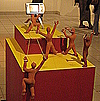
- http://www.groups.or.id: community funded free mailing-list service; in 2004 it served 2500+ mailing list with 65,000+ subscribes.
- http://www.ilmukomputer.com: a WSIS award winner that provide free ICT knowledge to the Indonesian society, funded by the society.
- http://www.voipmerdeka.net: the Rebelnet that run free VoIP service for and by Indonesian people: one of the largest free VoIP networks in the World
1. source: Onno W. Purbo, lecturer at Institute of Technology in Bandung
- 5 January 2005: ministry act that unlicenses the use 2.4GHz wifi frequencies, after many police raids and tiring online & physical debate with the government.

- Mid 2005: Police raid to Indonesian cybercafes (warnets) in many cities and take computers, arrest the operators / owners for interrogation of software piracy.
The concern is shifting to the corporate economy. This new juggernaut can potentially depoliticize cyber-exchanges by transforming civil society into little more than a sum of individual consumers having no identity other than the biggest name brands and latest corporate commodities. Thus, the Internet may potentially become a sanitized, homogenous medium whose main function is to sell consumerism to people and people to advertisers. 1
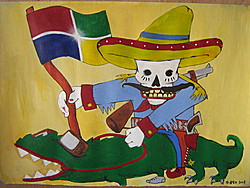
Through the shift from state to corporate hegemony the Internet becomes the gate through which privileged private interest invaded the public sphere. 2
1. Merlyna Lim (2003) "The Internet, Social Network and Reform in Indonesia"
2. Juergen Habermas (1991) "The Structural Transformation of the Public Sphere: An Inquiry into a Category of Bourgeois Society", MIT Press.
Mapping violence and injustice has a prominent role among the activities of all these humanitarian organisations.
- Kontras: Victim's Place for Solidarity Building in Fighting for Justice
- IKOHI: Commission for the Disappeared and Victims of Violence
- YPKP: Indonesian Institute for the study of 1965/1966 Massacre
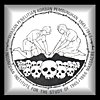
The raise of locative media and modern mapping technologies open the possibility to complete such historical documentation, while deepening the social importance of such technologies.
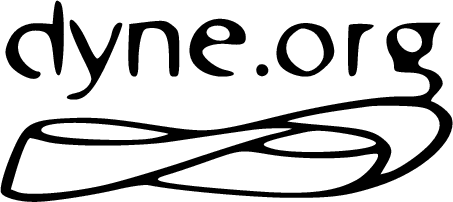
Jaromil's musings on http://jaromil.dyne.org
Indonesian diary on http://jaromil.dyne.org/journal/indonesia.html
Thanks to NLNET for supporting this research.
Selamat jalan!

|


|




|
 copyleft 2000 - 2009 dyne.org
foundation and respective authors. Verbatim copying
and distribution is permitted in any medium, provided
this notice is preserved.
Send inquiries & questions to dyne.org's hackers. copyleft 2000 - 2009 dyne.org
foundation and respective authors. Verbatim copying
and distribution is permitted in any medium, provided
this notice is preserved.
Send inquiries & questions to dyne.org's hackers.
|

|